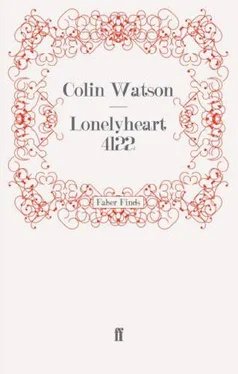“Dear Jack,” she sighed, “you are so masculine and sensible about these problems. I suppose that comes of your having had to deal with—oh, I don’t know—storms and mutinies and all that sort of thing.”
He laughed, and she was smiling, too, but in the next moment she looked glumly into the distance and murmured: “I don’t know why I’ve told you all this. You see, there is nothing I can do about it, in any case.”
“Simple, my dear. Send Mr Cambridge the money. Ease his conscience.”
“I am afraid you are wrong. It is not simple. I do not have the money.”
Trelawney waved a careless hand. “How long would it take? A week?”
“Oh, no, longer. Perhaps three. As I told you, my financial advisers are an old fashioned and you might say excessively fastidious firm. They have no faith in any process that takes less than a fortnight. And by then...well, it would be too late.”
“How do you mean, too late? The man’s not dying, surely?”
“Not dying. But in a serious condition in quite another sense. Something called a distress warrant has been applied for by some people to whom he owes money, apparently. Miss Cambridge says that unless the boat is sold within the next week it will be taken from him.”
“Good lord!” Thoughtfully, the commander straightened up from his bollard and took her arm. They strolled in silence towards the lock gates beyond which lay the tidal stretch of the river.
They had almost reached the lock when he stopped and faced her, frowning.
“Suppose,” he said, “that I were to buy that boat...”
She shook her head quickly. “He would never let it...”
“Wait, though,” he interrupted. “Suppose, as I say, that I were to buy it—but in your name...”
“I do not quite understand, dear.”
“In other words, let him think that you are the buyer—at the agreed price, of course—five hundred pounds—when it’s really me who’s put up the money.”
“But Jack, I could not ask you to do anything of the kind. You do not even know these people.”
“I know you, Lucy, and I think I’m a fair judge of character.”
She looked down modestly.
He took her hand. “And what would you say if you saw the Lucy bearing down the river here with me at the wheel, eh? Would you be ready to board her for better or for worse?”
“Jack!” Her eyes were shining.
“As a matter of fact, that’s just about what I was going to ask you in any case today. About us, I mean. Sailing in convoy.”
It was clear that Miss Teatime was much moved.
The commander gave her hand a reassuring squeeze.
“And now,” he said, “I’m going to tell you a little secret. Do you know why I happen to have five hundred pounds handy for the doing of good turns to old gentlemen with motor boats?”
He really was so droll. Miss Teatime could not suppress a little giggle.
“I’ll tell you why,” said Trelawney. “Being a very confident cove, I said to myself as soon as I saw you: that dear lady is going to be your lawful wedded, and as such she will want to live in a little cottage in the country!—of course, I didn’t know then that you were a sailor! No, a cottage, I said to myself, is what that charming woman will want, and you, Jack, know the very place...”
“Really?” exclaimed Miss Teatime.
“Really. The said cottage is for sale and may be secured, as estate agents say—one did say so this very morning—for a deposit of five hundred pounds. So now you know the little piece of business that brought me into town so early-O!”
“You’ve paid this deposit already?” She was quite flustered with excitement.
“Not exactly. The cash won’t be available until tomorrow. But I came to a firm understanding with the agent. The channel’s clear, old girl, absolutely clear.”
“Oh, Jack, how wonderful it sounds!” She paused. “But the money for the boat...I mean, how can you use it and still pay that deposit?”
Trelawney took her arm.
“That,” he said, “is something we shall have to have a little pow-wow about over lunch.”
Chapter Thirteen
After a meal which Commander Trelawney described as “confoundedly good messing”, he and Miss Teatime withdrew to a small deserted lounge where the proprietress of the Riverside Rest brought them coffee.
Miss Teatime poured, watched by the fond and by now slightly indolent eye of her companion.
“I love to see you do that,” he said. “Very womanly. Very homely.”
“Very ordinary,” corrected Miss Teatime, looking pleased.
“You wouldn’t say that if you’d spent your life between decks and had your tea handed to you in great slopping mugs by fellows looking like Robinson Crusoe.”
“No, perhaps not.” She passed him a cup.
Nothing of boats or cottages had been said during the meal, apart from an off hand request by Trelawney to be reminded of the valuation figure on the Lucy. Two thousand three hundred, was it? That’s right, she had said, with equal indifference.
Now Trelawney scratched one of his long ears, smoothed back his pale, sand-coloured hair and said that it wouldn’t be a bad idea to get down to a few plans.
“The best thing,” he began, “would be for me to take the money down to your friend, Mr Cambridge—or his daughter, rather—together with a letter from you saying that I’m acting as your agent. Not cash, mind—it would be silly to carry all that much on a train journey—but a cheque signed by you...”
“Oh, but the bank...”
He raised a hand. “I know what you’re going to say, but I’ll deal with that in a minute. I’ll give Miss Cambridge the cheque, make sure the boat’s seaworthy and bring her up here. She’ll be your property of course...”
“No, Jack. Yours.”
Trelawney made a grimace of good natured reproof.
“You’ll never be a business woman at that rate, my love. The deal will be in your name, so the Lucy will belong to you. For the time being, we’ll just look on the five hundred as a loan that I’m happy to make.
“Now this point about the bank. You were going to say that you haven’t enough to cover the cheque, weren’t you? Well, this is what we’ll do.
“There’s something called a joint account, you see. Lots of husbands and wives have one, and business partners and people like that. We’ll go round and open one at my bank, and tomorrow I’ll transfer into it the five hundred pounds I was going to use as a deposit on our cottage. Then you can sign the cheque for the boat and it will be drawn on that joint account, all shipshape and Bristol fashion. Do you see?”
Miss Teatime said that indeed she did and thought him terribly good at managing such things. But what about...
“The deposit on the cottage? Ah...” Trelawney beamed at her. “It so happens that the estate agent is quite an old friend of mine—that’s how I got to hear of the place, as a matter of fact—and he’ll be perfectly happy to reserve it for me on the strength of my post-dated cheque. That’s a cheque which is payable in, say, a month’s time. A sort of promise, really, and quite usual.”
“You are sure, Jack? I should not like you to be placed in an awkward situation.”
“Quite sure. And by the time the cheque has to be honoured, your money to repay the five hundred for the Lucy will have come through—you did say three weeks, didn’t you?—and been put into our joint account.”
He leaned back, smiling. “Now then, what do you think of that?”
“Well, it certainly does sound an excellent plan. I had no idea banks could be so accommodating. Mine seems so terribly unapproachable. Perhaps it is because I have never asked about such things.”
“Probably,” Trelawney said.
Читать дальше












